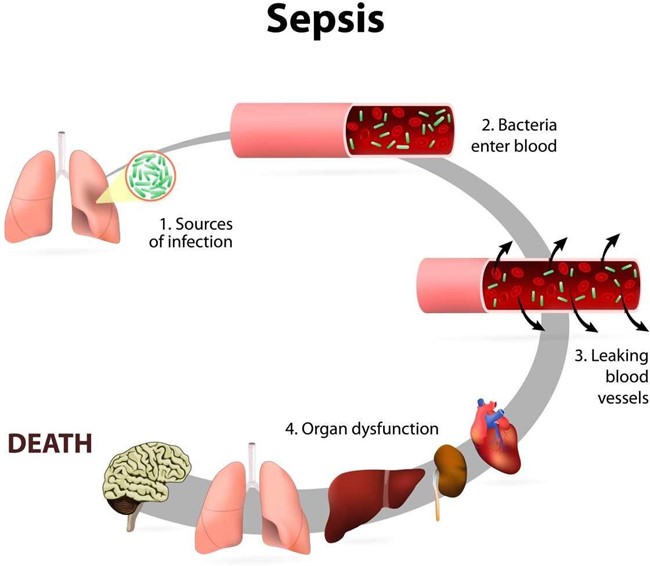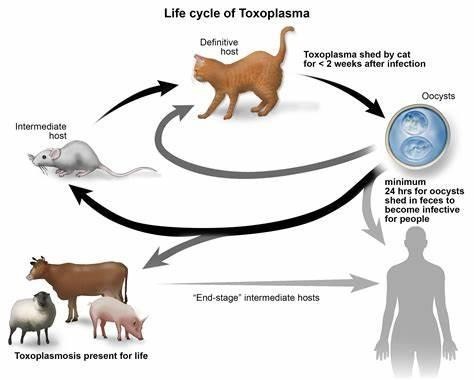Which of the following would the nurse expect to assess in a newborn who develops sepsis?
Increased urinary output
Hypothermia
Wakefulness
Interest in feeding
The Correct Answer is B
Choice A) Increased urinary output: This is not a sign of sepsis in newborns. In fact, sepsis can cause reduced urinary output due to poor blood flow to the kidneys and dehydration.
Choice B) Hypothermia: This is a sign of sepsis in newborns. Sepsis can cause changes in temperature, often fever, but sometimes low temperature. Hypothermia can indicate a severe infection that affects the body's ability to regulate its temperature.
Choice C) Wakefulness: This is not a sign of sepsis in newborns. Sepsis can cause reduced activity and lethargy due to inflammation and organ dysfunction.
Choice D) Interest in feeding: This is not a sign of sepsis in newborns. Sepsis can cause reduced sucking and difficulty feeding due to poor appetite, nausea, vomiting, and abdominal distension.

Nursing Test Bank
Naxlex Comprehensive Predictor Exams
Related Questions
Correct Answer is D
Explanation
Choice A) Increase oral intake of water between feedings is incorrect because this is not a helpful or recommended measure to help reduce the bilirubin in a newborn who is receiving phototherapy. Bilirubin is a yellow pigment that is produced when red blood cells are broken down. It is normally excreted by the liver into bile and then eliminated by the intestines. However, some newborns have high levels of bilirubin in their blood, which can cause jaundice, a condition that makes the skin and eyes look yellow. Phototherapy is a treatment that uses blue light to help break down the bilirubin and make it easier for the liver to process. Increasing oral intake of water between feedings does not have any effect on the bilirubin level, as water does not contain any nutrients or calories that can stimulate the liver or bowel function. Moreover, giving water to a newborn can cause hyponatremia, which is a low level of sodium in the blood that can lead to seizures, brain damage, or death. Therefore, this measure should be avoided or used with caution for newborns who are receiving phototherapy.
Choice B) Wrap the infant in triple blankets to prevent cold stress during phototherapy is incorrect because this is not a safe or appropriate measure to help reduce the bilirubin in a newborn who is receiving phototherapy. Cold stress is a condition that occurs when a newborn loses too much heat and has difficulty maintaining a normal body temperature. It can cause complications such as hypoglycemia, hypoxia, acidosis, or bleeding. Wrapping the infant in triple blankets may seem like a good way to prevent cold stress, but it can actually cause overheating, dehydration, or hyperthermia, which are equally dangerous for the newborn. Moreover, wrapping the infant in blankets can reduce the effectiveness of phototherapy, as it blocks the exposure of the skin to the blue light. Therefore, this measure should be avoided or used with caution for newborns who are receiving phototherapy.
Choice C) How to prepare the newborn for an exchange transfusion is incorrect because this is not a relevant or necessary measure to help reduce the bilirubin in a newborn who is receiving phototherapy. An exchange transfusion is a procedure that involves replacing some of the newborn's blood with donor blood to lower the bilirubin level and prevent brain damage. It is usually reserved for severe cases of jaundice that do not respond to phototherapy or other treatments. Preparing the newborn for an exchange transfusion involves obtaining informed consent from the parents, placing an umbilical venous catheter, monitoring vital signs and blood tests, and administering medications and fluids. However, these steps are not part of routine care for newborns who are receiving phototherapy, and they do not help to reduce the bilirubin level by themselves. Therefore, this measure should be done only when indicated by the physician and explained by the nurse.
Choice D) Increase the frequency of feedings is correct because this is an effective and recommended measure to help reduce the bilirubin in a newborn who is receiving phototherapy. Feeding provides nutrients and calories that can stimulate the liver and bowel function, which are essential for processing and eliminating bilirubin from the body. Feeding also helps to prevent dehydration, which can worsen jaundice and increase the risk of complications.
Feeding can be done by breast milk or formula, depending on the mother's preference and availability. The frequency of feedings should be increased to at least every 2 to 3 hours or on demand, as long as the newborn shows signs of hunger and satisfaction. Therefore, this measure should be encouraged and supported by the nurse for newborns who are receiving phototherapy.
Correct Answer is A
Explanation
Choice a) I will be certain to empty the litter boxes regularly is incorrect because this is a risky behavior for a pregnant woman who wants to prevent toxoplasmosis. Toxoplasmosis is an infection caused by a parasite called Toxoplasma gondii, which can be found in the feces of cats and other animals. If a pregnant woman gets infected with toxoplasmosis, she can pass it to her unborn baby, which can cause serious problems such as miscarriage, stillbirth, or birth defects. Therefore, a pregnant woman should avoid contact with cat litter and let someone else handle the litter boxes, or wear gloves and wash her hands thoroughly if she has to do it herself.
Choice b) I have to wash all of my fruits and vegetables is correct because this is a good practice for a pregnant woman who wants to prevent toxoplasmosis. Toxoplasmosis can also be transmitted through contaminated soil or water, which can adhere to fruits and vegetables. Therefore, a pregnant woman should wash all of her fruits and vegetables before eating them, and peel or cook them if possible, to remove any traces of the parasite.
Choice c) I won't eat raw eggs is correct because this is another good practice for a pregnant woman who wants to prevent toxoplasmosis. Toxoplasmosis can also be acquired through eating undercooked or raw meat or eggs that contain the parasite. Therefore, a pregnant woman should avoid eating raw eggs or any foods that contain them, such as mayonnaise, mousse, or homemade ice cream, and cook all of her meat and eggs thoroughly until they are no longer pink or runny.
Choice d) I need to be cautious when cooking meat is correct because this is also an important practice for a pregnant woman who wants to prevent toxoplasmosis. Toxoplasmosis can also be spread through handling raw meat that contains the parasite. Therefore, a pregnant woman should be careful when cooking meat and use separate utensils and cutting boards for raw and cooked meat, wash her hands and surfaces after touching raw meat, and avoid tasting raw meat while cooking it.

Whether you are a student looking to ace your exams or a practicing nurse seeking to enhance your expertise , our nursing education contents will empower you with the confidence and competence to make a difference in the lives of patients and become a respected leader in the healthcare field.
Visit Naxlex, invest in your future and unlock endless possibilities with our unparalleled nursing education contents today
Report Wrong Answer on the Current Question
Do you disagree with the answer? If yes, what is your expected answer? Explain.
Kindly be descriptive with the issue you are facing.
